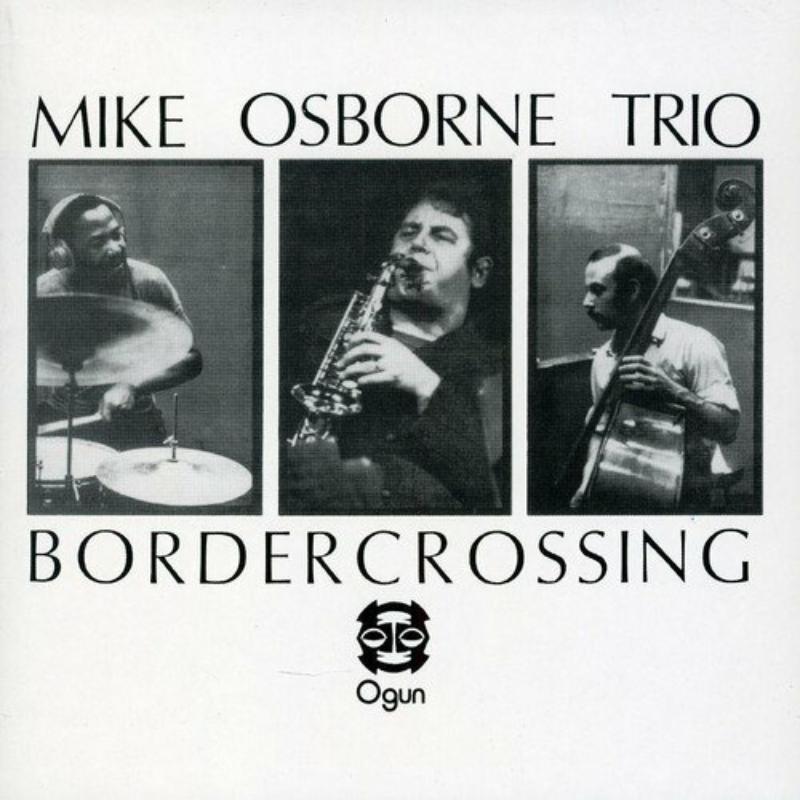
(Originally posted on Facebook, 3 December 2024)
Well, while I'm sitting here recovering from my operation - a.k.a. doing nothing - I might as well do some writing, give my poor left arm some purposeful exercise, so here's the third chapter in my Ogun Records survey:
MIKE OSBORNE TRIO: Border Crossing
(OG 300)
Track listing: Ken's Tune/Stop And Start/Awakening Spirit/Ist/Animation/Riff/Border Crossing
Mike Osborne (alto sax), Harry Miller (bass), Louis Moholo-Moholo (drums).
Recorded
live at the Peanuts Club, "The King's Arms," Bishopsgate, London, 28
September 1974. Produced by Mike Osborne and Keith Beal. Sleeve design:
George Hallett.
He
might have been absent from the Brotherhood's Willisau gig, but Mike
Osborne more than makes up for that in this stupendous record. In 1979's
The Illustrated Encylcopaedia Of Jazz,
Brian Case makes no bones about referring to Ossie as "Britain's finest
alto saxophonist." It's impossible to call that title now, given the
immense number of gifted altoists who have emerged onto the UK jazz
scene in the subsequent forty-five years, but it's undeniable that he
was one of our greatest.
The
Trio, with Miller and Moholo-Moholo, had been in operation since 1969,
but had to wait five years to be recorded. At that time Osborne was
principally known as one of the star players in Mike Westbrook's various
bands (of which Miller was also a member) but was in the process of
realigning himself musically with the South African exiles. There is
talk that his 1970 album Outback was
originally intended as a Trio album but became a Quintet record after
Chris McGregor and Harry Beckett were added to the line-up - some
reports at the time stated that Chris and Harry simply turned up to the
studio anyway, but the elaborate and thought-through arrangements of the
record's tunes suggest a good deal more organisation.
Anyhow,
the Trio enjoyed a successful long-term Friday night residency at the
Peanuts Club in Bishopsgate - although they were the core band, other
young horn players were often invited along to sit in and test their
improvisational skills - so it was logical that their first record be
recorded at one of their gigs. Border Crossing
represents just forty-two or so minutes from a typical evening of
blowing. In his sleevenote, Osborne states that the Trio had just
returned fron a successful, if exhausting, tour of mainland Europe, with
plenty of borders, both musically and physically, having been crossed.
So the record could be interpreted as a declaration of intent.
It
begins with the band's unofficial signature tune, "Ken's Tune" for Ken
May, who ran the Peanuts Club. This is a charming piece which in
different circumstances might pass for the theme to an animated British
children's television show of the seventies (N.B.: speaking as someone
who grew up watching children's television in Britain, I say that this
is a good thing). It gives the Trio a chance to establish and settle
into a basic post-bop groove. In a small group without any harmonic
instruments, the bassist has the not inconsiderable job of both holding
down the harmonic structure while simultaneously maintaining the
rhythmic flow; this Miller achieves with gracious ease, allowing
Moholo-Moholo to build up a steady, medium-volume percussive commentary.
All
eases along agreeably enough, although I note Osborne's oddly sour tone
and harsh-sounding reed - my father thought he made the alto sound like
a soprano (and if there was one thing my father didn't like, it was the
soprano saxophone). Nevertheless the Trio easily speeds up for the fast
bebop of "Stop And Start," becoming more energetic. "Awakening Spirit,"
which is Miller's tune (Ossie wrote all the others), maintains the same
optimistically forceful mood; it is one of those jaunty melodies which
looks forward to what the bassist will do in Isipingo.
"Ist" is different. Beginning with a sonorous arco bass
drone, and bells mysteriously rattling in the background - those
"children at play" again, perhaps? - the alto delivers a solemn lament, a
bit like Coltrane's "Alabama," before suddenly shifting into a fast
klezmer march. Throughout this ten-minute performance, the three
musicians eye each other up suspiciously, almost like a standoff, before
breaking into exploratory features for both alto and bass. The common
comparison point is Ornette's Golden Circle
trio, but musically Osborne's style sounds to my ear to have much more
in common with Eric Dolphy - particularly his various adventures with
Mingus - than Coleman. Almost at the end of this piece, Osborne utters a
terrible, guttural low-level scream through his horn, as though at the
end of his tether.
The
three tunes on side two flow into each other in an uninterrupted stream
of continuous music. "Animation" sees the Trio re-establishing its
post-bop framework - note how the central melody is only disclosed, and
then with some reluctance, some minutes into the piece.
The
band, prompted by Miller's bowed bass signals, then accelerate into
"Riff" - a more aggressive variant of "Stop And Start" - where they
reach a peak of quite terrifying intensity, all three players absolutely
fired up, Osborne groping for, then achieving, full free flight,
Moholo-Moholo never letting up on his rattling commentary.
Finally,
with the title track, the Trio achieve a state of nirvana, Osborne now
totally off the tonal scale, even essaying mimicry of Miller's
above-the-bridge bowed scrapings as the rhythm section thunders around
him. Perhaps what is most terrifying about this music is its absolute,
joyful certainty. And we are not permitted to forget that we are
witnessing a journey; that bebop riff is rephrased and the music fades,
the players already off on their evidently unending travels...
Current availability: on CD and download along with OG 810 (to be reviewed), available here.

No comments:
Post a Comment